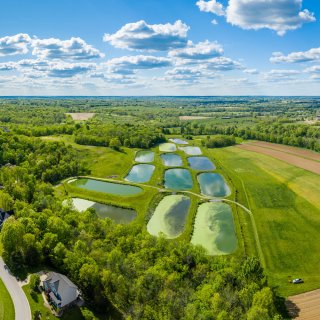Innovative Water Technologies for Lagoon Wastewater Systems in Small Communities Grants

EPA awarded $1,998,295 to two universities to accelerate innovative and alternative wastewater treatment technologies in lagoon and pond systems serving small communities that may require infrastructure improvements or process modifications in effluent quality for nutrients and ammonia.
Water technology innovation can help address pressing water resource challenges and can play a crucial role in ensuring adequate supply and quality of the nation’s water resources. Contamination from wastewater in rural areas may pose a potential threat to small drinking water systems and private wells relying on multiple drinking water sources. Small and rural communities along with private well owners may lack advanced drinking water treatment capabilities along with the financial, technical and human resource capacity to ensure that they have clean and safe drinking water supplies.
Lagoon-based water treatment plants (WWTPs) have been widely used in the United States and around the world for municipal, agricultural, and industrial applications. These systems are particularly attractive to small communities because of their low operating cost, built-in solids storage, and low minimal operating requirements. There has been limited information available on the performance, reliability, impacts, capital costs and operations and maintenance costs of various lagoon technologies and on their ability to consistently remove ammonia and nutrients.
The goal of this research is to provide small communities with innovative, reliable and cost-effective water technology designed to remove nutrients and optimize processes to ensure safe and clean water.
West Virginia University, Morgantown, West Virginia
Award: $1,000,000
Project Title: Sustainable Nutrient Removal Opportunities for Small Communities with Lagoon Wastewater Systems
Principal Investigator (PI): Kevin Orner
Study Locations: West Virginia, California
This research project will identify the various technology options currently implemented at lagoon facilities serving less than 10,000 people to remove ammonia, total nitrogen, and total phosphorus to low levels. Through this research, researchers will help evaluate the nutrient removal performance and contextual challenges of these technologies that can efficiently and consistently remove nutrients in different types of lagoon systems in different climate.
View the research abstract for this project.
Michigan Tech University, Houghton, Michigan
Award: $998,293
Project Title: Innovative Water Technologies for Lagoon Wastewater Systems in Small Communities
Principal Investigator (PI): Michelle Jarvie-Eggart
Study Locations: Michigan Tech University, Houghton, Michigan, Copper Harbor, Michigan
The research will assist a small community in Michigan with a population less than 10,000 to improve nutrient removal of ammonia, nitrogen, and phosphorus from the wastewater treatment lagoons using innovative technologies. The project team will demonstrate a floating treatment wetland (FTW) system deployed in a lagoon in northern Michigan. The nutrients will be monitored by physical tests and the biological community (bacteria) population composition. The growth in the pond associated with the FTW will be monitored by next generation sequencing and hyperspectral in-situ and remote sensing. The removal rate of nutrients and dissolved organics will be investigated by sunlight experiments. The system is expected to lower nutrient levels from those currently in the lagoon used in this study and improve the quality of discharge to natural waterways.
View the research abstract for this project.
